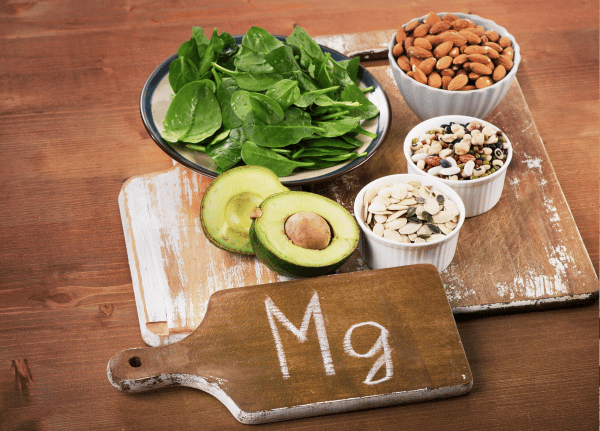If you're over 40, stressed or tired (anyone?!), then I'm going to suggest that Magnesium could be your new best friend.
I struggle when I don't get enough magnesium. I can feel my legs twitching, my muscles stiffen and I find it hard to switch off.
That could be because it's known as the ‘relaxation mineral', but not only does it help your muscles relax, but it also has a huge role to play in regulating your hormones.
In fact magnesium has over 300 jobs to do in the body every day!
You can watch the video below or listen to the podcast;
Why are we often Magnesium deficient?
It’s one of our most vital nutrients, but our modern day lives mean that we are often deficient. This can be due to;
- Not enough magnesium rich foods in our diets (mainly dark green leafy veg!)
- Soil quality isn't as good as it used to be so levels tend to be lower
- It is quickly depleted by stress (which most of us suffer from!)
Symptoms of low Magnesium
It's not always easy to spot, but these are some common symptoms of deficiency;
• Muscle spasms, cramps or restless leg syndrome
• Headaches and migraines
• Constant fatigue or feeling weak
• Depression, anxiety, brain fog and mood swings
• Craving chocolate (cacao is high in magnesium)
• Quick exhaustion during exercise
• Insomnia and waking in the night
• Constipation (if you're not having at least 1 bowel movement a day)
• Feeling wired or overwhelmed
• PMS or menstrual cramps
Magnesium and your hormones
Magnesium is critical for your hormone function. Here are a few of its jobs;
• Helps with stress – calms your nervous system, lowers adrenaline and cortisol
• Helps your thyroid – vital for production of thyroid hormones
• Makes energy – without magnesium, there is less energy production!
• Helps with sleep – relaxes muscles and helps with deeper sleep
• Lowers blood sugar – helps with insulin control – better mood, energy, stress, weight
• Helps make steroid hormones – Oestrogen, Progesterone and Testosterone (can help with hot flushes)
• Activates Vitamin D – helps Vitamin D to work
• Increases serotonin – your happy hormone, and the pre-cursor to melatonin (your sleep hormone)
Food Sources
Leafy greens (eg kale, spinach), whole grains, nuts, seeds, beans, and chocolate (the darker the better!).
If you don't or can't get enough of these foods in your diet every day, OR you're stressed, have gut issues or have any of the symptoms above, you should try supplementing to see if it makes a difference.
Which Supplement should you choose?
- Mg Oxide – this is the cheap form (often included in many supplements) and the least well absorbed.
- Mg Citrate – this is the most popular magnesium supplement, probably because it is inexpensive and easily absorbed. It helps with constipation as it acts to relax the bowel (unsuitable for those with looser bowel movements).
- Mg Glycinate – this one is one of the most bioavailable and absorbable forms, and suitable for those who suffer from diarrhoea.
- Mg Taurate – useful for people with cardiovascular issues, since it is known to be heart protective.
- Mg Malate – best for those suffering from fatigue, as malic acid is essential for energy production. And also useful for muscle pain.
- Mg Threonine – can cross the Blood Brain Barrier, so excellent for brain health, depression, anxiety, brain fog.
- Mg Chloride – good for detoxing and kidney function.
- Mg Sulphate – best in the bath! (eg Epsom salts).
I would recommended a dose of 300-400mg per day (best taken before bed if you need to relax), but check with your Doctor if you are on any medications or have an existing health condition.
Contact us if you'd like a personalised approach to your health issues.
And do visit my collection at Approved Vitamins for some of my favourite supplement brands.

